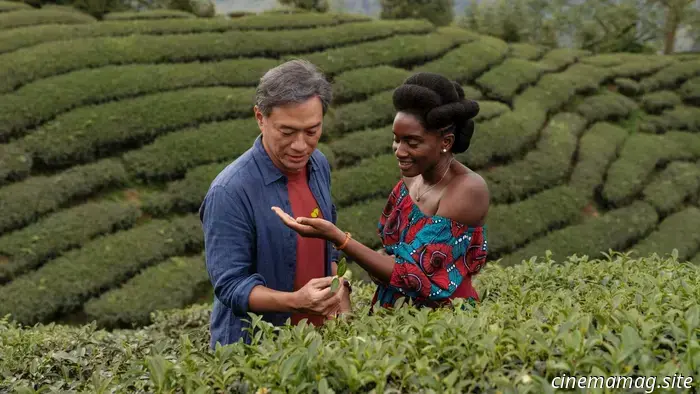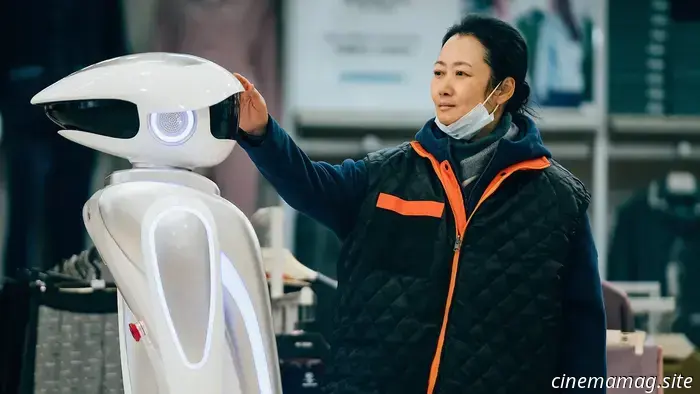
Black Tea Review: Abderrahmane Sissako Shapes a Gentle Romance
Would you prefer someone to softly whisper in your ear or shout? Generally, the response would be the former, but if the noise level becomes so high that you can barely hear—and may even lose interest in the message—you might think twice. This effectively summarizes Black Tea, which progresses at such a slow pace while reaching an inevitable conclusion that leaves you questioning its true intention.
With Abderrahmane Sissako seemingly directing only one film per decade, this return is even more disappointing. As a filmmaker who has skillfully depicted the slow-moving tragedies of Mali and Mauritania in his previous works, he is an important voice in cinema. In Black Tea, he appears to attempt to present what looks like a classical romantic melodrama from the start. A Western audience imposing traditional expectations on Sissako’s films may be misguided for various reasons, yet one still senses a certain awkwardness caught between two cinematic worlds—something that lacks both fervor and depth.
We first encounter Aya (Nina Melo) on her wedding day at a public ceremony marrying what seems to be the town’s mayor. In the brief time we see, it becomes clear that he is quite controlling. When it’s time to say “I do,” she courageously escapes. Fast forward, and she has fled the Ivory Coast to start anew in Guangzhou, China, living within the city’s African diaspora. There, she soon meets Cai (Chang Han), a middle-aged Chinese man who owns the tea shop where she works. A romance blossoms between them as they discover shared interests.
Despite their gentle and considerate personalities, some uncertainty arises regarding whether their relationship can withstand the racial and class differences that could pull them apart. However, “tension” may not accurately characterize the events in Black Tea, which mirrors the quietness of its characters. The film expands to include Aya’s coworkers and Cai’s family, showcasing perspectives of those who might oppose their love, yet nothing seems to escalate the narrative significantly. Once again, it appears that Aya’s quest for self-determination is too evidently framed within a cyclical structure that the film establishes.
Sissako’s talent is consistently recognizable, whether through his graceful crossfades, his skill at capturing subtle gestures from his actors, or his deftness in camera placement—no one would argue he lacks effort in that regard. However, it feels as though he is heading toward a narrative dead-end, where the exhibited skill doesn’t yield a deeper significance. Ultimately, it appears that the film hesitates to embrace melodrama, reflecting the same timidity as its characters. One might expect that a decade of experience would have cultivated more anger.
Black Tea will be released in theaters on Friday, May 9.
Other articles
 Lethal Weapon is set to be released on 4K Ultra HD in June.
Warner Bros. Home Entertainment has revealed that Richard Donner's buddy cop classic, Lethal Weapon, featuring Mel Gibson and Danny Glover, will be released on 4K Ultra HD this June. The set will include both the 1987 theatrical version and the extended director’s cut from 2000. You can check out the cover artwork and further details here... Mel Gibson stars […]
Lethal Weapon is set to be released on 4K Ultra HD in June.
Warner Bros. Home Entertainment has revealed that Richard Donner's buddy cop classic, Lethal Weapon, featuring Mel Gibson and Danny Glover, will be released on 4K Ultra HD this June. The set will include both the 1987 theatrical version and the extended director’s cut from 2000. You can check out the cover artwork and further details here... Mel Gibson stars […]
 PCS' Rocky III collectible diorama features a showdown between Rocky and Apollo in their personal rematch.
Premium Collectibles Studio has unveiled the 1:4 scale diorama of Rocky III, showcasing the climactic scene from the sports drama sequel where former rivals and now friends, Rocky Balboa (Sylvester Stallone) and Apollo Creed (Carl Weathers), face off in their private third match. It is currently available for pre-order at a price of $1,425; take […]
PCS' Rocky III collectible diorama features a showdown between Rocky and Apollo in their personal rematch.
Premium Collectibles Studio has unveiled the 1:4 scale diorama of Rocky III, showcasing the climactic scene from the sports drama sequel where former rivals and now friends, Rocky Balboa (Sylvester Stallone) and Apollo Creed (Carl Weathers), face off in their private third match. It is currently available for pre-order at a price of $1,425; take […]
 Caught by the Tides Review: Jia Zhangke and Zhao Tao Navigate 20 Years of History
Note: This review was initially published as a part of our coverage of Cannes 2024. Caught by the Tides is set to be released in theaters on May 9. Jia Zhangke's films frequently evoke a sense of déjà vu: "We find ourselves once more in the northern Chinese city of Datong," Giovanni Marchini Camia noted for Sight and Sound in 2019, "we're once again the
Caught by the Tides Review: Jia Zhangke and Zhao Tao Navigate 20 Years of History
Note: This review was initially published as a part of our coverage of Cannes 2024. Caught by the Tides is set to be released in theaters on May 9. Jia Zhangke's films frequently evoke a sense of déjà vu: "We find ourselves once more in the northern Chinese city of Datong," Giovanni Marchini Camia noted for Sight and Sound in 2019, "we're once again the
-Movie-Review.jpg) The Uninvited (2024) - Film Review
The Uninvited, 2024. Written and Directed by Nadia Conners. Featuring Elizabeth Reaser, Walton Goggins, Lois Smith, Eva De Dominici, Rufus Sewell, Pedro Pascal, Michael Panes, Kate Comer, Roland Rubio, Annie Korzen, and Bobby Burkich. SYNOPSIS: An unexpected guest disrupts a party, leading to a series of comedic mishaps and a reevaluation of life. As plans unfold for a significant event, […]
The Uninvited (2024) - Film Review
The Uninvited, 2024. Written and Directed by Nadia Conners. Featuring Elizabeth Reaser, Walton Goggins, Lois Smith, Eva De Dominici, Rufus Sewell, Pedro Pascal, Michael Panes, Kate Comer, Roland Rubio, Annie Korzen, and Bobby Burkich. SYNOPSIS: An unexpected guest disrupts a party, leading to a series of comedic mishaps and a reevaluation of life. As plans unfold for a significant event, […]
Black Tea Review: Abderrahmane Sissako Shapes a Gentle Romance
Do you prefer someone to quietly speak in your ear or shout? Generally, you'd choose the former, but if the volume is so high that you can hardly hear—and may even start to lose interest in the conversation—you might think twice. This succinctly captures the essence of Black Tea, which keeps its levels so low.
